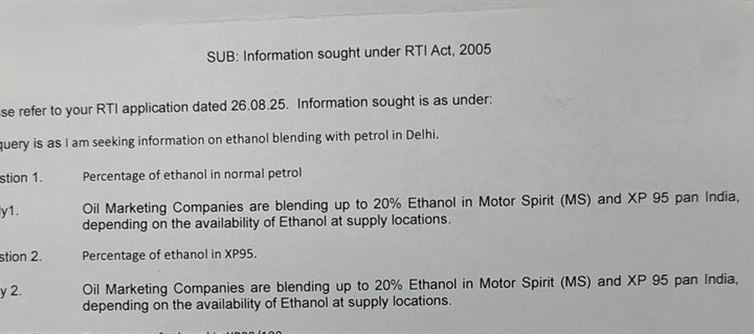
An RTI has revealed a shocking truth: E95 petrol in india contains 20% ethanol, and consumers are paying a premium for it. Ethanol blending was pitched as a strategy to cut imports and reduce emissions—but instead, it’s hitting our wallets harder. Pure E0 petrol, theoretically cheaper, is being undercut by E20 blends due to pricing formulas, taxation, or cross-subsidy logic that remain opaque. While other countries display ethanol ratios proactively, indians had to file RTIs to uncover what they were paying extra for.
1. 20% Ethanol, Full Price
E95 petrol is actually 20% ethanol (E20), but instead of saving money, consumers pay more—raising questions about pricing and transparency.
2. The RTI Revelation
It took a Right to Information request to confirm the blending ratio—information that is openly displayed in other countries. Consumers are kept in the dark until activists intervene.
3. Dilution Should Be Cheaper, Not Costlier
Common sense dictates that E0 petrol, which is pure, should cost more than a diluted E20 blend. Yet, pricing mechanisms seem to invert this logic, leaving consumers paying a premium for ethanol addition.
4. Taxation & Cross-Subsidy Mystery
Higher costs for E20 may arise from hidden taxation policies, fuel pricing formulas, or cross-subsidy mechanisms—but none of these are clearly communicated to the public.
5. Ethanol Blending’s Original Pitch
The government promised ethanol blending as a strategy to cut import bills and reduce emissions, not as a method to charge more. The policy’s execution appears disconnected from its stated benefits.
6. Global Transparency Gap
Other countries proactively display ethanol ratios at pumps. India’s need for RTIs highlights a lack of transparency and consumer awareness.
7. Why We’re Paying Extra
Until pricing formulas are clarified and transparency is enforced, indians are effectively paying more for a fuel blend that should theoretically be cheaper—a premium for dilution.
⚡ Bottomline
E95 petrol contains 20% ethanol, but consumers are paying a higher price than pure E0 petrol. RTI exposes what the government hasn’t voluntarily disclosed: premium costs for dilution, opaque pricing, and a policy failing its promise to cut imports and emissions. Transparency, logic, and accountability in fuel pricing are urgently needed—otherwise, we’re all paying extra for a “green” lie.




 click and follow Indiaherald WhatsApp channel
click and follow Indiaherald WhatsApp channel